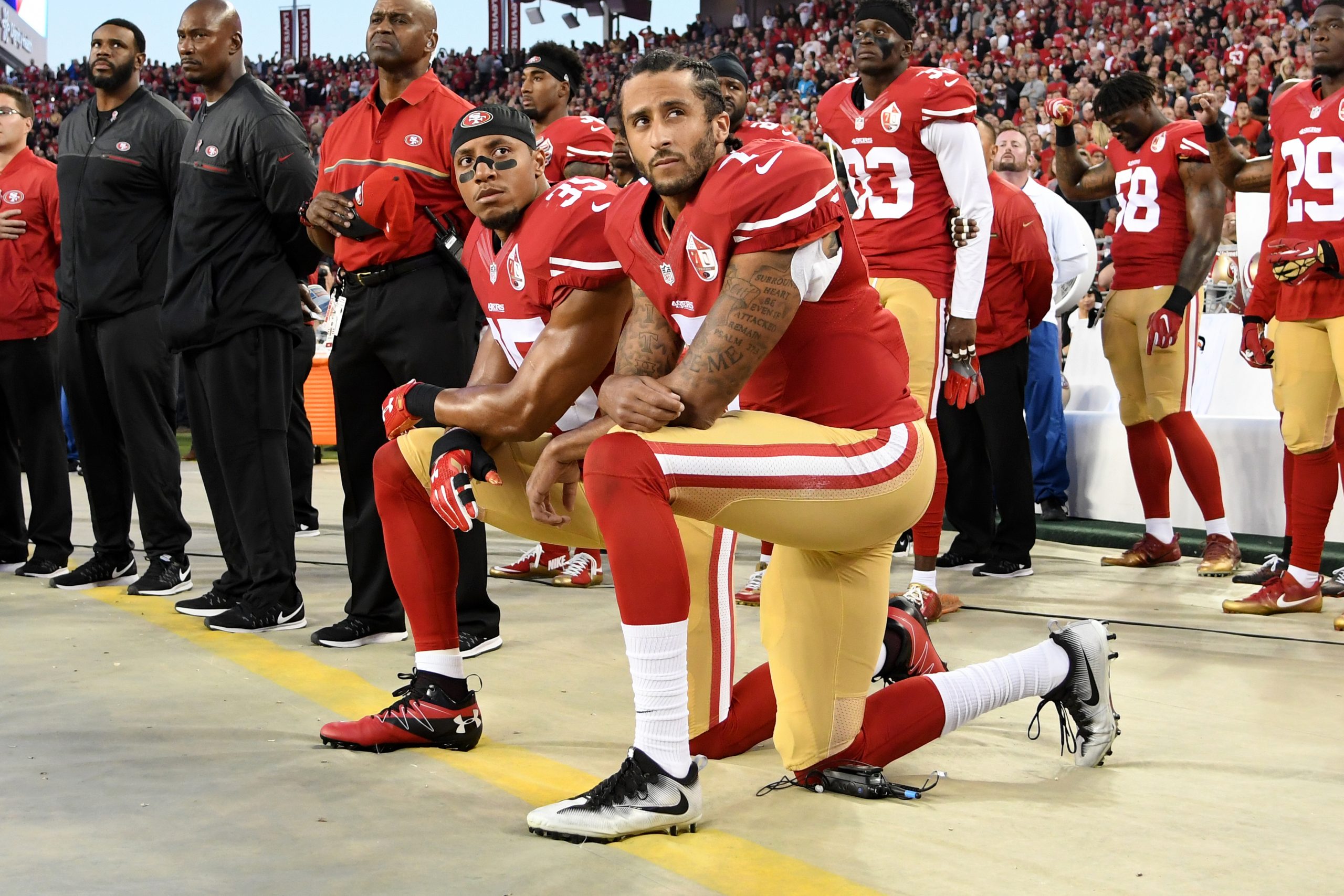Former San Francisco 49ers quarterback Colin Kaepernick has filed an official grievance against the NFL alleging collusion between NFL owners to keep him out of the league in response to his peaceful protests during the National Anthem before games in the 2016-17 season.
This action comes during increased awareness and high tension among Americans and NFL fans across the country with palpable anxiety between opposing sides on the issue of racial inequality, police brutality, the speech rights of those who protest it, and general, if not compulsory, patriotism.
The grievance requests an arbitration hearing between Kaepernick and the NFL as afforded to him by the Collective Bargaining Agreement signed in August 2011 between the NFLPA and the NFL owners. If he wins the arbitration, he may be entitled to compensatory damages, and the owners found to have colluded could be fined.
The centermost allegation of the grievance points to an amorphous term that is all too familiar among those who have been paying attention to American politics lately. Collusion, while explicitly not illegal, but implicitly wrong, has dominated our conversations about political and governmental ethics in recent months.
We have learned that it is highly difficult to prove, even with intense investigation. Kaepernick seeks to prove collusion between the two or more of the 32 billionaire owners which is one of the highest burdens of proof there is to meet in legal realms. He does have one thing on his side; it is expressly forbidden by the CBA to collude against a player in almost any way regarding the details of his employment.
Kaepernick also cites the implication of the United States President and alleges “calculated coordination from the Executive Branch of the United States government” with the owners of the NFL teams. There are a few interesting claims and developments in the document that are especially worth noting as well:
- Kaepernick’s grievance claims that collusion between the NFL owners was a statistical certainty. However, he only points to circumstantial evidence to back his charge. If he cannot retrieve or ultimately uncover more direct evidence such as documentation and/or communication between owners reaching an agreement (implicit or explicit), his chances of proving much beyond perceived bias are diminished substantially. His lawyers must find evidence that literally implicates owners or staff hereof in an agreement to keep Kaepernick from consideration of a roster spot. This is among the highest of legal standards to meet.
- The grievance does not mention Kaepernick’s 1st amendment rights being violated. It does allude to his right to speak, but does not say the owners violated his rights. Although it literally mentions that “Mr. Kaepernick has a constitutionally protected First Amendment right to engage in a silent and peaceful protest,” it explicitly has not asserted that the league has violated this right for purposes of the arbitration. The 1st Amendment of the US Constitution gives rights of free speech and protection from government action that attempts to prohibit or abridge his ability to say what he wants. It does not protect private citizens from other private citizens (Kaepernick vs NFL). This is important to note. Arbitrators likely cannot and will not attempt to address this as a matter of his right to protest legally under the constitution.
- The grievance mentions evidence that there is no rule in the CBA barring his silent protest during the National Anthem. It also correctly points out that the NFL Commissioner Roger Goodell announced a proposed rule change that forces players to stand for the anthem on a compulsory basis. This supports the idea that the rule did not already exist in the rules in any other form or else he would simply enforce the books as written.
- A supporting detail of the grievance claims that the President of the United States has been an “organizing force in the collusion among team owners”. This may be supported, in one instance at least, by purported phone calls confirmed by Dallas Cowboys owner Jerry Jones publicly saying he has spoken to the President about the protest and reaction to it from all parties. It is worth pointing out that the CBA does not expressly ban NFL owners from taking directives or orders from the President of the United States. It only bans collusion between two or more owners or one owner and the league office, including but not limited to, Goodell.
It is highly unlikely that Kaepernick, with the facts presented in his grievance, meets the standards of proving collusion between NFL owners. However, it is fair to say that he has enough to try his case.
It is also completely possible that the arbitrator in this case finds that it is impossible to prove such collusion exists at all barring electronic communications via phone, including text, voicemail or auditory, email, or written documents that would be admissible as evidence.
In theory, the arbitrator could easily say no collusion was proven by Kaepernick’s representatives simply because there’s no powers vested in the arbitrator or Kaepernick’s legal team to gather the evidence necessary to prove almost anything.
It is not clear if he would need to prove the collusion occurred via documented communications or meet a particular jurisprudential standard not yet explained by the arbitrator. The entire burden of proof falls on the legal representation of Kaepernick, and this seems to be a long shot even with the best of lawyers on his side.
Add The Sports Daily to your Google News Feed!
